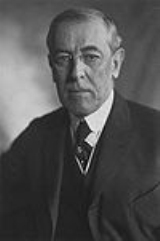
, from 1913 to 1921. A leader of the Progressive Movement, he served as President
of Princeton University
from 1902 to 1910, and then as the Governor of New Jersey
from 1911 to 1913. Running against Progressive ("Bull Moose") Party
candidate Theodore Roosevelt
and Republican
candidate William Howard Taft
, Wilson was elected
President as a Democrat
in 1912.
In his first term as President, Wilson persuaded a Democratic Congress
to pass major progressive reforms. Historian John Cooper argues that in his first term, Wilson successfully pushed a legislative agenda that few presidents have equaled, and remained unmatched up until the New Deal
.
1913 President Woodrow Wilson addresses American Civil War veterans at the Great Reunion of 1913.
1913 President Woodrow Wilson triggers the explosion of the Gamboa Dike thus ending construction on the Panama Canal.
1913 The Federal Reserve Act is signed into law by President Woodrow Wilson, creating the Federal Reserve.
1915 William Jennings Bryan resigns as Woodrow Wilson's Secretary of State over a disagreement regarding the United States' handling of the sinking of the {{RMS|Lusitania}}.
1915 U.S. President Woodrow Wilson marries Edith Bolling Galt Wilson while president of the United States.
1916 President Woodrow Wilson sends 12,000 United States troops over the U.S.-Mexico border to pursue Pancho Villa.
1916 U.S. President Woodrow Wilson signs a bill incorporating the Boy Scouts of America, making them the only American youth organization with a federal charter.
1917 World War I: President Woodrow Wilson of the still-neutral United States calls for "peace without victory" in Europe.
1917 The Congress of the United States passes the Immigration Act of 1917 over President Woodrow Wilson's veto. Also known as the ''Asiatic Barred Zone Act'', it forbade immigration from nearly all of south and southeast Asia.
1917 World War I: President Woodrow Wilson asks the U.S. Congress for a declaration of war on Germany.
The object of education is not merely to draw out the powers of the individual mind: it is rather its right object to draw all minds to a proper adjustment to the physical and social world in which they are to have their life and their development: to enlighten, strengthen and make fit.![]()
The white men were roused by a mere instinct of self-preservation … until at last there had sprung into existence a great Ku Klux Klan, a veritable empire of the South, to protect the Southern country.![]()
Most men are individuals no longer so far as their business, its activities, or its moralities are concerned. They are not units but fractions; with their individuality and independence of choice in matters of business they have lost all their individual choice within the field of morals.![]()
Liberty is its own reward.![]()
Liberty has never come from the government. Liberty has always come from the subjects of the government. The history of liberty is a history of resistance. The history of liberty is a history of the limitation of governmental power, not the increase of it. ![]()
Power consists in one's capacity to link his will with the purpose of others, to lead by reason and a gift of cooperation.![]()

